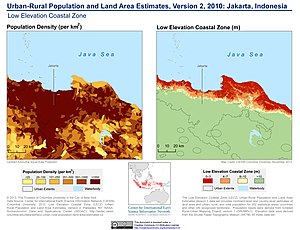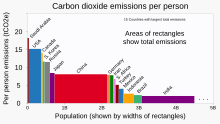Climate change in Indonesia

Climate change in Indonesia is of particular significance, because its enormous coastal population is particularly at risk to sea level rise and because the livelihoods of so many of its people depend on agriculture, mariculture and fishing, all of which could be severely impacted by temperature, rainfall and other climatic changes. Some environmental issues in Indonesia such as the cutting of mangrove forests (i.e. in Java) to make room for fish farms further worsen the effects of climate change (i.e. sea level rise).[1][2] In 2019 Indonesia is estimated to have emitted 3.4% of world greenhouse gas emissions:[3] from deforestation, peatland fires, and fossil fuels.[4]
Greenhouse gas emissions[]

As of 2021 Indonesia is the 5th heaviest cumulative emitter at over 100 Gt.[5] Emissions for 2019 are estimated at 3.4% of the world total.[6] Coal in Indonesia is a big emitter,[7] because the government subsidizes coal power.[8] As of 2021 over 30 coal-fired power plants are planned or under construction,[9] and corruption has been alleged.[8] Perusahaan Listrik Negara, the state electricity company, is in financial difficulties but, as of 2022, intends to build more coal-fired power stations.[8]
Impacts on the natural environment[]
Temperature and weather changes[]
Global climate change is expected to increase temperatures in Indonesia by 0.8 °C by 2030.[10]


Sea level rise[]
In 2019, about half of the nation's capital, Jakarta, was located beneath sea level, with some neighborhoods sinking "as fast as 9 inches a year."[11] Continued carbon emissions at the 2019 rate, in combination with unlicensed groundwater extraction, is predicted to immerse 95% of Northern Jakarta by 2050.[11]
Impacts on people[]
Economic impacts[]
Agriculture[]
Changes in rainfall patterns are predicted to have an adverse impact on Indonesian agriculture, due to shorter rainy seasons.[10] Indonesia experienced crop losses and adverse impacts to fisheries as a result of climate change as early as 2007.[12]
Fishery[]
By 2020, climate change had impacted Indonesia's fishermen.[13]
Mitigation and adaptation[]
Mitigation approaches[]
Coal is expected to provide the majority of Indonesia's energy through 2025. Indonesia is one of the world’s biggest producers and exporters of coal.[14] In order to keep its commitments to the Paris Agreement, Indonesia must stop building new coal plants, and stop burning coal by 2048.[15]
Indonesia’s first wind farm opened in 2018, the 75MW Sidrap Wind Farm in Sindereng Rappang regency, South Sulawesi.[16] Indonesia announced it was unlikely to meet the 23% renewable energy by 2025 target set in the Paris Agreement.[17]
In 2020, "Indonesia will begin integrating the recommendations from its new Low Carbon Development Initiative into its 2020-2024 national development plan." Mangrove protection and restoration will play an important role in meeting the goal of cutting greenhouse gas emissions by over 43 percent by 2030.[18]
Policies and legislation[]
In February 2020, it was announced that the People's Consultative Assembly is preparing its first renewable energy bill.[14]
Also in February 2020, proposed changes to environmental deregulation have raised new concerns, and could "allow illegal plantations and mines to whitewash their operations."[19]
See also[]
- Flooding in Jakarta
- Climate of Indonesia
- Environment of Indonesia
- Environmental issues in Indonesia
- Energy in Indonesia
- Regional effects of global warming
References[]
- ^ Where once were mangroves, Javan villages struggle to beat back the sea
- ^ The importance of mangroves to people
- ^ "Report: China emissions exceed all developed nations combined". BBC News. 2021-05-07.
- ^ "The Carbon Brief Profile: Indonesia". Carbon Brief. 2019-03-27. Retrieved 2021-05-07.
- ^ "Analysis: Which countries are historically responsible for climate change?". Carbon Brief. 2021-10-05. Retrieved 2021-10-10.
- ^ "China's Greenhouse Gas Emissions Exceeded the Developed World for the First Time in 2019". Rhodium Group. Retrieved 2021-08-25.
- ^ Orim, Ruby (2020-12-20). "Indonesia Has Seen a Whopping 313% Increase in Greenhouse Gas Emissions Since 1990". Climate Scorecard. Retrieved 2021-07-15.
- ^ a b c "Coal Fever in Indonesia". Earth Journalism Network. 2022-01-13. Retrieved 2022-02-07.
- ^ "South-East Asia". E3G. Retrieved 2021-09-18.
- ^ a b Oktaviani, Rina; et al. (2011). "The impact of global climate change on the Indonesiannn economy". IFPRI, International Food Policy Research Institute. Retrieved 2018-12-05.
- ^ a b Dickinson, Leta (2019-05-01). "Indonesia might need a new capital because of climate change". Grist. Retrieved 2019-05-16.
- ^ "Climate Change in Indonesia". Global Greenhouse Warming. 2018. Retrieved 2018-12-05.
- ^ "Indonesian fishermen grapple with climate change". The Jakarta Post. January 13, 2020. Archived from the original on 2020-01-13. Retrieved 2020-02-19.
- ^ a b Gokkon, Basten (2020-02-14). "In Indonesian renewables bill, activists see chance to move away from coal". Mongabay Environmental News. Archived from the original on 2020-02-15. Retrieved 2020-02-19.
- ^ Nugraha, Indra (2019-12-02). "Indonesia 'must stop building new coal plants by 2020' to meet climate goals". Mongabay Environmental News. Archived from the original on 2019-12-02. Retrieved 2020-02-20.
- ^ Andi, Hajramurni (2018-07-02). "Jokowi inaugurates first Indonesian wind farm in Sulawesi". The Jakarta Post. Archived from the original on 2018-07-05. Retrieved 2020-02-19.
- ^ "Indonesia Struggles to Meet Renewable Energy Target". Voice of America. November 29, 2018. Archived from the original on 2019-07-19. Retrieved 2020-02-19.
- ^ Barclay, Eliza (2019-12-12). "Supertrees: Meet Indonesia's mangrove, the tree that stores carbon". Vox. Retrieved 2020-02-20.
- ^ Jong, Hans Nicholas (2020-02-11). "Experts see minefield of risk as Indonesia seeks environmental deregulation". Mongabay Environmental News. Archived from the original on 2020-02-12. Retrieved 2020-02-20.
External links[]
- Climate change in Indonesia
- Environmental issues in Indonesia
- Climate change by country